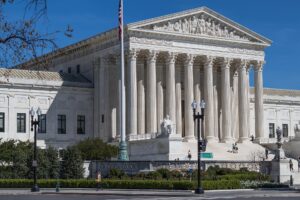In a major decision released yesterday, the U.S. Supreme Court delivered a win for objective truth in upholding Tennessee’s law that prohibits gender transition procedures on minors. The ruling in United States v. Skrmetti affirms what many parents, doctors, and legislators have been saying for years: protecting children from irreversible medical harm is both constitutional and necessary.
This decision couldn’t come at a more critical time for Pennsylvania.
Senate Bill 843—the “Do No Harm Act”—is pending in the Pennsylvania legislature. This commonsense measure would prohibit puberty blockers, cross-sex hormones, and gender transition surgeries on minors and ensure that taxpayer funds are not used to finance these interventions. The Supreme Court’s decision reinforces that states have the authority to protect children from risky and experimental medical practices.
What the Supreme Court Decided
The high court’s majority opinion, authored by Chief Justice Roberts, upheld Tennessee’s law restricting life-altering gender procedures for children. The ruling cited Tennessee’s findings that such interventions can cause irreversible harm, including sterilization, increased risk of disease, and psychological trauma. The Court acknowledged the lack of reliable scientific evidence supporting these procedures and affirmed that a state’s interest in protecting minors outweighs ideological pressures from activists or federal agencies.
Additionally, Justice Clarence Thomas strongly criticized the notion of deferring to the so-called expert consensus, saying,
First, so-called experts have no license to countermand the “wisdom, fairness, or logic of legislative choices.”
Second, contrary to the representations of the United States and the private plaintiffs, there is no medical consensus on how best to treat gender dysphoria in children.
Third, notwithstanding the alleged experts’ view that young children can provide informed consent to irreversible sex-transition treatments, whether such consent is possible is a question of medical ethics that States must decide for themselves.
Fourth, there are particularly good reasons to question the expert class here, as recent revelations suggest that leading voices in this area have relied on questionable evidence, and have allowed ideology to influence their medical guidance.
Pennsylvania now has a moral and legal roadmap to follow.
Why SB 843 Is Urgently Needed
“Removing healthy body parts from children is not healthcare. It’s not backed in science, and it’s not recognizing the reality of regret felt by so many who have since detransitioned,” said Dan Bartkowiak of the Pennsylvania Family Institute during the DoNoHarm rally held earlier this year. “Every child deserves the opportunity to grow up healthy and whole.”
Yet right here in Pennsylvania, minors have undergone irreversible surgeries and drug treatments with lasting consequences, including sterilization, sexual dysfunction, and cognitive harm.
And it’s happening on your dime.
Millions of taxpayer dollars have been used in recent years to fund these experimental procedures on children. Pennsylvania residents—whether aware or not—are financially enabling irreversible harm to our most vulnerable citizens.
Worse, these procedures are being justified using low-quality, biased studies that fail basic standards of evidence-based medicine. Systematic reviews across the globe—from Sweden to the United Kingdom—have concluded that the risks far outweigh the benefits and that these interventions should not be administered to minors.
Even countries that once led the way in gender medicalization—like Finland, Sweden, and the UK—have backtracked. They’ve returned to more cautious, therapeutic approaches because the data simply doesn’t support radical medical transitions for youth.
This Is Not Healthcare—It’s Harm
Let’s be clear: removing healthy body parts from children is not healthcare. It is irreversible harm, often performed without fully informed consent. Children, by definition, lack the long-term foresight and maturity to consent to procedures with lifelong consequences. And too often, emotionally manipulative language from ideologically driven practitioners and institutions pressures parents into compliance.
The voices of regret are growing louder. Detransitioners—young people who once underwent these procedures—are speaking out about the permanent damage done to their bodies and minds. Yet many lawmakers and medical institutions are still turning a blind eye.
Pennsylvania Must Act
The Do No Harm Act (SB 843) is a reasonable, science-backed response to an urgent crisis. It protects children from unproven, harmful medical interventions. It protects parents from emotional manipulation. And it protects taxpayers from being forced to fund practices that cause irreversible damage.
The Supreme Court has now made it abundantly clear: Pennsylvania has the constitutional authority to act. There is no excuse for inaction.
SB 843 is not about politics—it’s about protecting children. It’s about drawing a line in the sand and saying: our children are not experiments. They deserve better.
TAKE ACTION
Contact your state lawmakers today. Tell them to support SB 843, the Do No Harm Act. Urge them to follow the lead of the Supreme Court and states like Tennessee by defending the health, safety, and future of Pennsylvania’s children.
Image credit: Children’s Hospital of Philadelphia by Jeffrey M. Vinocur, licensed under CC BY 2.5 and CC BY-SA 3.0. Source: Wikimedia Commons.




